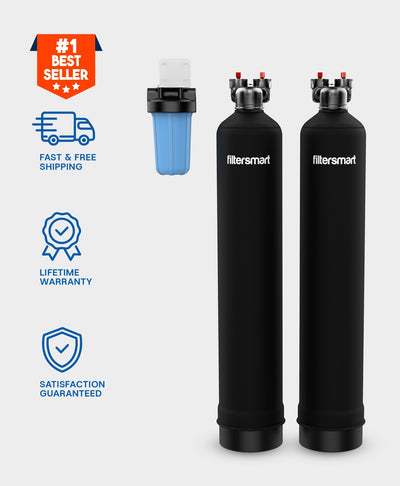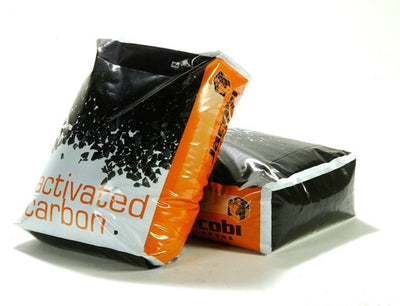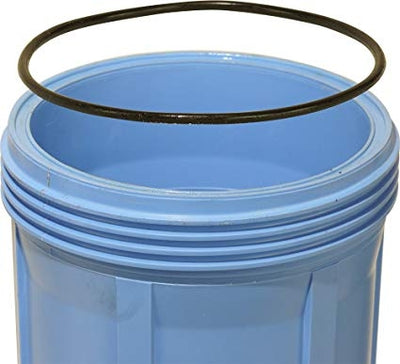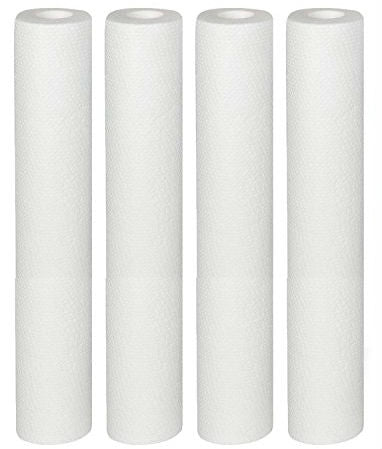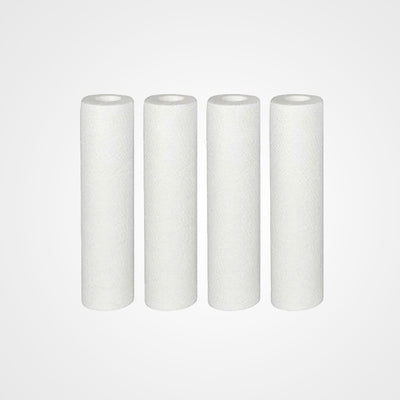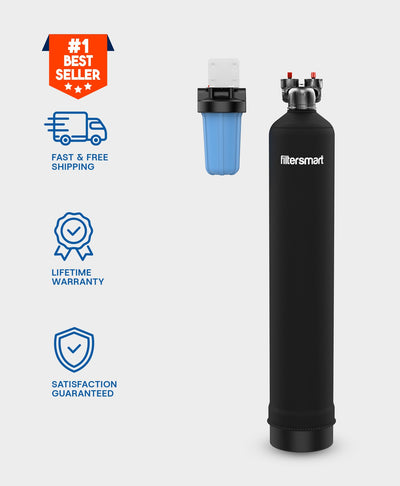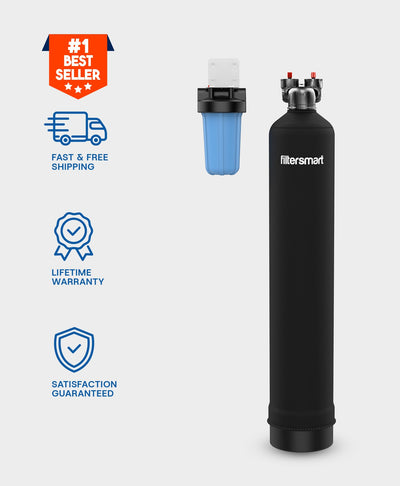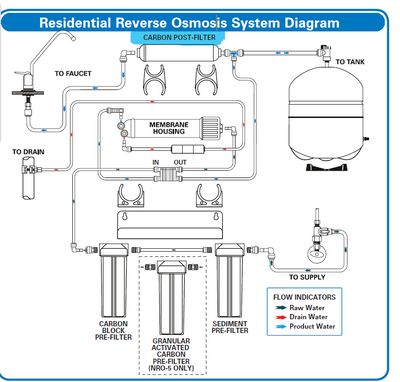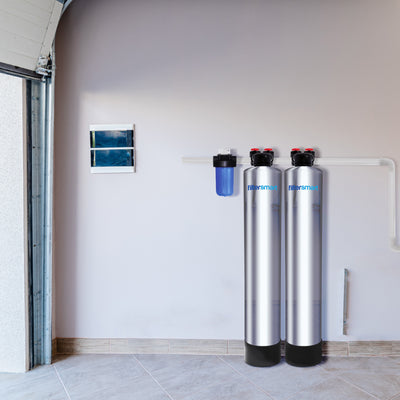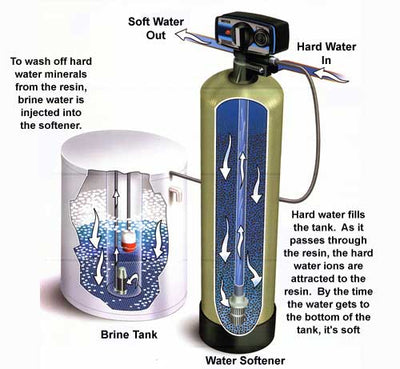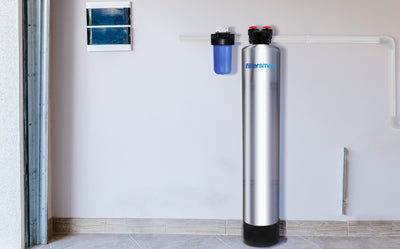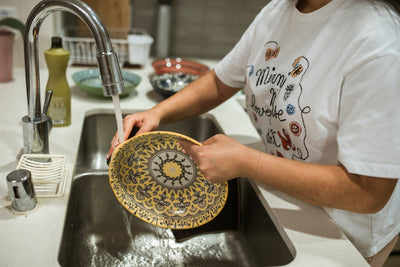How much salt does a water softener use? Probably more than you think. In this article, we’re going to break down how much salt a traditional, ion-exchange water softener uses.
Why Do You Need to Use Salt?
In order to soften water, you need to get rid of the magnesium and calcium in hard water. Those are the two minerals that make up the majority of the hardness, and therefore cause all your problems, like dry skin, broken appliances, and soap-scum-stained bathtubs and faucets. In order to get rid of magnesium and calcium, ion exchange softeners use a negatively charged resin. The magnesium and calcium binds to the resin, but eventually the resin becomes saturated with too much of it.
At that point, you would have two options: 1) buy more resin (or a whole new water softener), which is completely impractical and expensive, or 2) find a way to reuse the same resin that’s in your softener.
Lucky for you (but maybe less lucky for the environment), option #2 is easily doable with a lot of salt. When a strong brine solution is flushed through the resin, the sodium sticks to the resin and it washes off the magnesium and calcium
The next time through, the magnesium and calcium will wash off the sodium and bind to the resin, extending the lifespan of the resin for quite a while.
But How Much Salt Are We Talking About?
You might have remembered from science class that salt is anonrenewable resource, and therefore you might have some hang-ups about using it to soften your water.
Or you might be one of the103 million Americans currently suffering from high blood pressure, and your doctor told you you need to cut back on your sodium consumption. Naturally, you use salt to add some zing to your French Fries (when you’re allowed to have them) -- you don’t need it to flavor your water, so you don’t want any extra coming from your tap.
After you use a water softener to soften your water, is there really enough salt left in it to damage your health?
In short: Yes, definitely.
We’ve written before about the exact amount of sodium that gets added to your drinking water, and we’ve found that it works out to roughly300mg per day per person per 10 grains of hardness.
How Often Should You Add Salt to the Water Softener?
So, now that you know that you consume the equivalent of a McDonald’s French Fry in terms of additional sodium intake per day at an average hardness level of 10 grains per gallon, how often do you have to add salt to the softener? And how much salt do you have to buy?
This will depend on your water softener, but even the most efficient ion exchange softener still uses. To use an example, the Fusion NLT is marketed as “the most efficient water softener in the world.” Its smallest unit, the MXX-200, still uses 6lbs of salt per 30,000 grains of hardness. That’s on the “High-Efficiency” setting, too.
The average family of four, according to the US Geological Survey, uses anywhere from80-100 gallons of water per day. So, if they live in an area that has just 10 grains per gallon of hard water, their system still has to regenerate once every 3-4 weeks.
That’s still 6lbs of salt per month, or 72lbs of salt per year.
Unfortunately, that’s on the highest efficiency setting for the most efficient softener we could find. Even then, you’ll probably find that the high efficiency setting doesn’t soften your water nearly enough, so let’s also look at the maximum numbers…
In that case, the MXX-200 uses 30lbs of salt per 64,000 grains. That adds up to about 360lbs of salt per year.
So, even for the most efficient ion exchange water softener, you’re bound to use anywhere from 70-400lbs of salt per year -- and that salt is going straight in your body. Keep in mind, though, that we arrived at these figures using optimistic numbers from a brand new high-efficiency softener. These figures actually underestimate what most people say is the average for a normal-sized family:one 40lb bag of salt per week, or 480lbs of salt per year.
Are You Even Legally Allowed to Own an Ion Exchange Softener?
In order to regenerate the resin, a lot of wastewater also needs to be flushed out. A lot of counties across the US --California in particular -- are taking a legal stand against this type of water softener.
In areas where drought is common, it doesn’t make much sense to flush out gallons upon gallons of water every week to get rid of a minor nuisance.
What Are the Alternatives So You Can Use Less Salt?
Here at FilterSmart, our systems are based on a different technology than ion exchange. We use template assisted crystallization to change the structure of magnesium and calcium so that it stays suspended in water, not clinging to your surfaces and skin.
The result is less limescale production without getting rid of the healthy spring-like minerals of magnesium and calcium that are actually good for you.
If you want to learn more (including independent research from Arizona State University on the efficacy of template assisted crystallization, check outour blog).
If you’d like to give one of our systems a try, it comes with a full life-time warranty and a 90 day trial period. If you find that it doesn’t work for you, we’ll take it back free of charge. Check out thestore here.
Conclusion: How Much Salt Does a Water Softener Use?
The simple answer is more salt than you want.
The longer answer is about 400lbs of salt per year, on average, for a medium-sized family and a moderate hard water problem. That means that, individually, you’re consuming an additional 300mg of sodium just by drinking water every single day.
If you’re one of the 103 million Americans who suffers from hypertension, that might be something you want to stay away from.
Also, if you’re environmentally conscious or if you live in an area that has banned ion exchange salt-based softeners, you might want to look into other options.
Luckily, that’s exactly what we sell here at FilterSmart. Please don’t hesitate to contact us with any questions, andcheck out our line of products.







